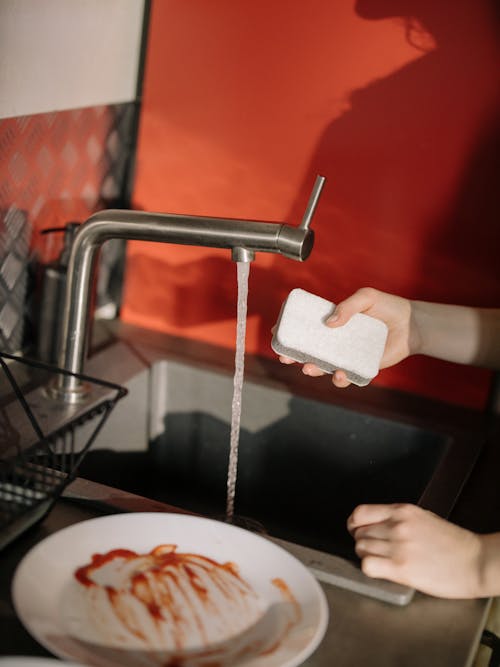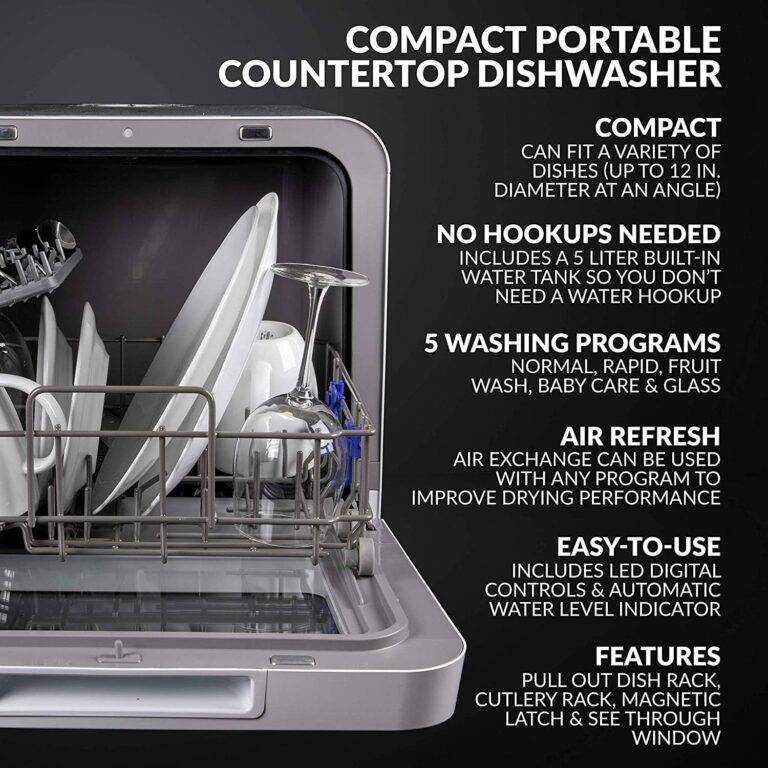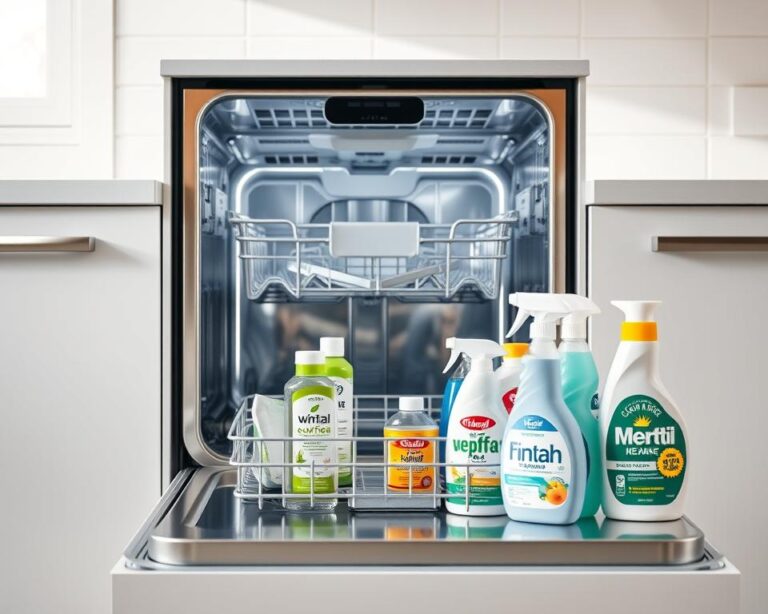Keeping your dishwasher in top shape involves regular dishwasher filter cleaning. This vital maintenance task not only enhances the performance of your appliance but also ensures that your dishes come out spotless. Most modern dishwashers from well-known brands like Whirlpool, GE, and KitchenAid have manual filters that users must remove and clean1. By doing so at least once a month, you can prevent unpleasant odors, gritty dishes, and food residue buildup1. The filter plays a crucial role in trapping food particles during the cleaning cycle, boosting efficiency and hygiene2. Moreover, cleaning the filter helps maintain optimal water circulation, ultimately leading to cleaner dishes and prolonging the lifespan of your dishwasher2.
Whether you’re a seasoned homeowner or a first-time dishwasher user, understanding how to clean your dishwasher filter is key to effective dishwasher maintenance tips. Although the initial cleaning may be a bit smelly, subsequent cleanings become easier and faster1. With common household items like vinegar or baking soda, you can achieve fantastic results and ensure that your dishwasher runs efficiently3. Let’s dive deeper into the importance of this simple yet essential task!
Understanding the Importance of Dishwasher Filter Cleaning
Understanding the importance of cleaning your dishwasher filter is essential for optimal appliance performance. Regular cleaning significantly reduces the risk of blocked filters, which may lead to dirty dishes and unpleasant smells. Bosch suggests that if you pre-rinse your dishes, the filter should be cleaned three to six times a year; without pre-rinsing, this should increase to four to twelve times annually4. Miele recommends checking the filter every 50 washes to maintain efficiency4. Not only does a clean filter ensure better cleaning performance, but it also helps protect the pump from clogs.
Whirlpool notes that specific guidelines depend on whether dishes are scraped or rinsed before loading. For general use, cleaning your filter monthly is advised, with some models needing every two to three weeks5. Regular filter maintenance keeps the dishwasher running efficiently and greatly improves the lifespan of the appliance. Observing any grittiness or grime on your dishes is a clear indication that it’s time for a thorough cleaning5. Consider incorporating a vinegar rinse to eliminate odor-causing food particles between cleanings as part of your dishwasher filter cleaning guide.
Types of Dishwasher Filters
Understanding the types of dishwasher filters is crucial for maintaining your appliance effectively. Dishwashers generally come equipped with two primary types of filters: manual and self-cleaning. Manual filters, commonly found in brands like Whirlpool and GE, require regular maintenance, ideally at least once a month, to prevent food build-up and ensure optimal water flow6. On the other hand, self-cleaning filters automatically grind up food particles, simplifying the cleaning process7. However, they can be louder due to the grinding action6.
Regularly assessing the condition of these filters can help maintain the efficiency of your dishwasher. Visible signs of food accumulation or unpleasant odors may indicate that it’s time to perform a cleaning routine7. Knowing the type of filter you have can guide you in developing a cleaning schedule that best fits your usage habits and ensures the longevity of your appliance8. Be sure to consult the owner’s manual for detailed guidance, as the specifics could vary between different models and brands.
Signs Your Dishwasher Filter Needs Cleaning
Recognizing the signs your dishwasher filter needs cleaning is essential to maintain its efficiency. If you notice leftover food particles on your dishes after a cycle, this could indicate a clogged filter that requires immediate attention9. Unpleasant odors often emanate from dishwashers due to a dirty filter, making it a common issue for many households10. A clear signal to check your filter is if your glassware appears cloudy or if a gritty residue coats your dishes, hinting at food particles stuck within the filter10. Furthermore, slow drainage after a wash cycle can signify a filter that isn’t working properly, potentially causing clogging or pooling water9. Regular cleaning can prevent these issues and ensure your dishwasher operates effectively.
How to Locate Your Dishwasher Filter
Knowing how to locate your dishwasher filter is essential for proper maintenance. Typically, you can find the filter at the bottom of the dishwasher, just beneath the lower dish rack. Its exact position may vary; it could be situated in one of the corners or around the base of the spray arm. If you own a newer dishwasher model, it may feature a cylindrical upper filter and a flat lower filter that requires cleaning11. Older models used self-cleaning filters shaped like a round plastic grid, so understanding your specific model is key11.
To access the filter, first, remove the bottom dish rack. This will expose the filter located on the dishwasher floor12. Depending on dishwasher usage, the frequency of cleaning the filter may range from once a week to once a year9. For those washing 4 to 7 loads per week, cleaning is recommended twice a year if dishes are not rinsed before loading9. Be aware that some dishwashers may have only an upper filter11 and require specific cleaning methods due to varying filter systems12.
Tools and Supplies for Dishwasher Filter Cleaning
Cleaning your dishwasher filter effectively requires just a few essential tools and supplies for dishwasher filter cleaning. Start with a sink or large bowl where you can soak the filter. Hot water and dish soap with degreasing properties are important for breaking down any stubborn grease that may have accumulated over time. A soft brush or sponge will help you scrub away debris without damaging the filter material.
Vinegar is another valuable supply; it’s a natural cleaner that can assist in removing odors and grime. Brands often recommend soaking dishwasher filters in a mixture of warm water and white vinegar for at least 30 minutes for optimal results13. Regular cleaning is key, as a dirty filter may lead to unwanted residue, drainage issues, and poor dishwasher performance1415.
Consider acquiring additional specialized cleaning products like Dawn Powerwash dish spray that can enhance your scrubbing effectiveness. Following these guidelines ensures that you maintain efficient dishwasher operation and extend the lifespan of your appliance, ultimately resulting in cleaner dishes and fewer repairs needed1415.
Learn more tips about maintainingyour dishwasher.
Step-by-Step Guide to Clean Your Dishwasher Filter
Cleaning your dishwasher filter is crucial for optimal performance and longevity. Follow this step-by-step dishwasher filter cleaning guide for best results. First, remove the bottom rack of your dishwasher to access the filter, which typically features a twist-lock mechanism. Gently twist the filter counter-clockwise to unlock it and lift it out of the dishwasher.
Next, soak the filter in warm, soapy water for several minutes. This helps to loosen any grime and debris. For a thorough clean, use a soft-bristled brush to scrub away any stubborn particles. Rinse the filter thoroughly with hot water to ensure no soap remains.
After rinsing, reinsert the filter by aligning it correctly and locking it back in place. This simple process can dramatically enhance your dishwasher’s efficiency. Remember, frequent cleaning is recommended at least once a month to prevent build-up and ensure proper drainage167.
Best Methods for Dishwasher Filter Cleaning
Cleaning your dishwasher filter regularly is crucial for maintaining optimal performance. Experts recommend cleaning the dishwasher’s filter at least once a month, as it often gets clogged with food waste17. Some users may overlook this task for several months or even longer, which can lead to a host of issues such as dirty dishes and odors17. The best methods for dishwasher filter cleaning include using a warm, soapy water solution along with a soft brush to prevent damage. For more stubborn grease or debris, a soak in a mixture of vinegar and water can effectively loosen any buildup.
Many dishwasher models feature different designs and mechanisms for filter removal, which may impact the cleaning process17. For instance, self-cleaning filters generally require maintenance every two to three months, while manual-clean filters call for attention at least once a month18. To maintain cleanliness, running a monthly cleaning cycle with two cups of distilled white vinegar in an open container on the top rack is highly recommended18. Following these best methods for dishwasher filter cleaning will help keep your appliances in top shape.
DIY Dishwasher Filter Cleaning Tips
Regular maintenance is key to effective DIY dishwasher filter cleaning. To ensure optimal performance, develop a routine to check the filter monthly. For self-cleaning filters, a clean every two to three months is typically sufficient, while manual-clean filters should be addressed at least once a month to maintain functionality18. Soaking the filter in a vinegar solution helps eliminate greasy build-up, and it is recommended to run a cleaning cycle with distilled white vinegar at least once a month12.
Moreover, avoiding harsh cleaning tools, such as wire brushes, is essential as they can damage your filter. Instead, stick to soft brushes or cloths. Establishing these habits ensures your dishwasher runs smoothly, preventing potential blockages and pump issues18. It’s wise to be cautious about what goes into your dishwasher; materials like paper labels and wooden utensils can create debris, which adds to clogs.
By incorporating these simple practices into your cleaning routine, you’ll enhance the longevity and efficiency of your dishwasher. For further details on deep cleaning, check out this resource.
Dishwasher Maintenance Tips
To keep your dishwasher running efficiently, implement these dishwasher maintenance tips regularly. It is vital to clean your dishwasher once a month to prevent debris buildup and odors, ensuring the appliance continues to work effectively1920. Utilizing white vinegar during a monthly cleaning cycle can help eliminate stuck food particles and residual detergent, enhancing the overall cleanliness of your dishwasher1918.
Regularly inspect the interior of your dishwasher and check for clogs in the spray arms; using a toothbrush can help remove stubborn debris that may hinder water flow1918. Proper loading of dishes is crucial not only for cleanliness but also for conserving water—running your dishwasher at least once a week can keep the motor seals functioning well20.
Additionally, cleaning the dishwasher gasket monthly with a vinegar-water solution can help prevent odors and mold from developing19. Overall, paying attention to these dishwasher maintenance tips can significantly enhance the lifespan and efficiency of your appliance.
Professional Dishwasher Filter Cleaning Services
If you find yourself hesitant about tackling the cleaning of your dishwasher filter, consider engaging professional dishwasher filter cleaning services. These experts provide a thorough cleaning of filters, which typically requires only about 5 minutes if done weekly21. They can also perform comprehensive checks for other potential issues in your appliance, addressing components like electronic control boards and sensors, which can lead to heating failures or inefficient cleaning22. With nearly 30 years of experience, service professionals can offer valuable insights into long-term care and maintenance, ensuring that your dishwasher operates effectively throughout its average lifespan of 12 years23
Hiring professional services not only helps maintain the efficiency of your dishwasher but also provides peace of mind. According to Mr. Appliance, their customer testimonials number over 300,000, which reflects their reliability in dishwasher repair services23. Regular maintenance and cleaning can prevent unnecessary costs; for instance, fixing a dishwasher averages around $25023. Make sure to check for cleaning of key components and repairs to avoid long-term issues while extending the lifespan of your dishwasher with proper care.
Common Misconceptions About Dishwasher Filters
Many homeowners fall prey to common misconceptions about dishwasher filters which can hinder proper maintenance. A prevalent belief is that self-cleaning filters do not need any attention. In reality, these filters still require periodic inspection to ensure they function correctly. A survey revealed that 92% of dishwasher users underestimated the necessity for regular filter upkeep24. This misunderstanding can lead to significant appliance performance issues, as the filter plays a crucial role in how well the dishwasher operates.
It is also concerning that only 45% of dishwasher owners recognize that these filters need regular cleaning to prevent performance problems, such as residue buildup on dishes24. Many users overlook the impact of their detergent choice, where over 75% of repairs relate to issues stemming from incorrect detergent usage24. This neglect can cause inefficient cleaning results, with 80% of users attributing poor outcomes solely to appliance malfunctions24.
Clearing up the common misconceptions about dishwasher filters is essential for effective maintenance practices. Users often forget that regular intervention can save time and money in the long run, highlighting the importance of staying informed about proper dishwasher care.
The Cost of Neglecting Your Dishwasher Filter
Neglecting your dishwasher filter can have serious repercussions, leading to food residue buildup and unpleasant odors each time you open the appliance. When smaller particles, like coffee grounds, escape due to a clogged filter, the cleanliness of your dishes is compromised, making this a significant concern for your kitchen hygiene25. The cost of neglecting your dishwasher filter extends beyond just the immediate inconvenience; it can result in costly repairs averaging between $100 to $300 for general issues26.
Moreover, if clogs occur, they could lead to flooding or even a complete shutdown of your dishwasher due to lack of water flow, which can severely disrupt your daily routine25. Regular cleaning not only helps avoid these hazardous issues but is also a far more cost-effective option than repairing or replacing essential components like the pump or heating element, which can set you back between $100 to $50026. By dedicating a little time to maintain your dishwasher filter, you are saving yourself a significant amount of money down the line.
In summary, the cost of neglecting your dishwasher filter is high, leading to both poor appliance performance and potential major repairs. To extend the lifespan of your dishwasher, which averages 8 to 15 years, make regular maintenance a priority to prevent nasty odors and clogs25. A small effort today can save you from costly damages tomorrow.

FAQ
How often should I clean my dishwasher filter?
It is recommended to clean your dishwasher filter at least once a month to maintain performance and prevent odors.
What are the best methods for cleaning a dishwasher filter?
The best methods include soaking the filter in warm, soapy water, and using a soft brush to scrub away debris. For tougher grease, a vinegar solution can be helpful.
Where can I find the filter in my dishwasher?
The dishwasher filter is typically located at the bottom of the dishwasher, under the lower dish rack. If you’re having trouble finding it, consult your owner’s manual.
What signs indicate that my dishwasher filter needs cleaning?
Look for signs like leftover food particles on cleaned dishes, unpleasant odors coming from the dishwasher, or slow drainage. Cloudy glassware can also indicate a clogged filter.
Can I use vinegar to clean my dishwasher filter?
Yes, vinegar is an effective natural cleaner. Soaking the filter in a vinegar solution can help loosen stubborn buildup.
What tools do I need for cleaning my dishwasher filter?
Essential supplies include hot water, dish soap with degreasing properties, a soft brush or sponge, and a sink or large bowl for soaking the filter.
Should I hire a professional for dishwasher filter cleaning?
If you’re uncomfortable performing maintenance tasks, hiring professional dishwasher filter cleaning services can be beneficial. They provide thorough cleaning and assess other potential issues.
How do self-cleaning dishwasher filters work?
Self-cleaning filters require less frequent attention—usually every two to three months—but should still be inspected periodically to ensure proper function.
What happens if I neglect to clean my dishwasher filter?
Neglecting the dishwasher filter can lead to poor cleaning performance, foul odors, and drainage problems, which may result in costly repairs or even replacement of the appliance.
Are there any common misconceptions about dishwasher filters?
Yes, many believe that self-cleaning filters don’t require any attention at all. However, they still need periodic inspection and maintenance to function effectively.



